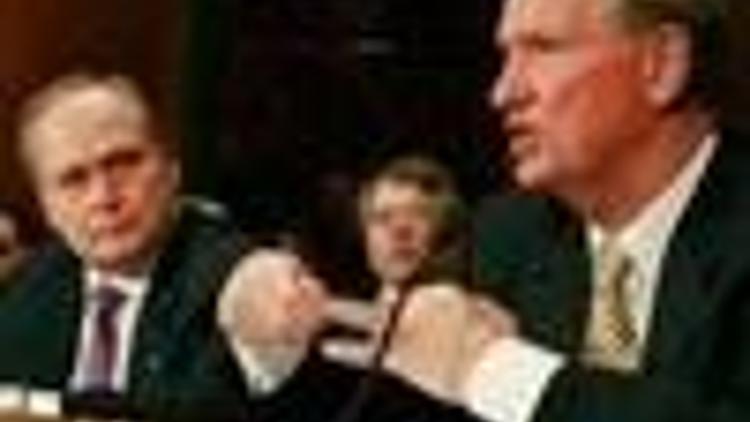U.S. automakers must change course to get bailout
Güncelleme Tarihi:

U.S. auto executives pitched doom to Congress to win a bailout and left town empty handed. Now they will have to make a U-turn and convince lawmakers their industry has a prosperous future.
The chief executives of General Motors Corp, Chrysler LLC and Ford Motor Co never recovered politically after landing in Washington on their corporate jets with hats in hand.
A horrible week for the chiefs ended with their hopes for an immediate bailout dashed and Senate Majority Leader Harry Reid and House Speaker Nancy Pelosi chastising them for sending mixed signals and not owning up to industry's problems.
"We want them to get their act together," Reid said.
Uncomfortable talking about business prospects and financial details in public, Rick Wagoner of GM, Alan Mulally of Ford and Bob Nardelli of Chrysler spent two days doing just that in congressional hearings.
GM said it would need between $10 billion to $12 billion in bailout money while Ford and Chrysler sought $7 billion each.
Their message centered on a belief that the industry's outlook was so bleak that a collapse was possible. And because they employ nearly 250,000 people and impact 1-in-10 jobs nationally, insolvency of one or more of their companies would send shockwaves through the broader economy, they said.
Wagoner told the House Finance Committee that he did not like asking for money, but it was "reasonably probable" that some part of the U.S. auto industry "will not survive" if their request was rejected.
But Reid said at a news conference that GM, Ford and Chrysler were unable to "convince the Congress or the American people" that this "government bailout will be its last."
Pelosi was upset Detroit initially asked for congressional support for a merger. But when "they came to see us," she said, the message had changed to: "We need an infusion of cash."
The Democratic leadership, which supported a $25 billion bailout proposal that was derailed by Republican objections on Wednesday, wants Detroit now to demonstrate how the companies plan to overcome problems and compete with leaner foreign rivals.
"Until they show us the plan, we cannot show them the money," Pelosi said.
All three companies responded with statements. GM promised to "deliver a plan" that "shows them a viable General Motors." Ford plans to change course as well. "We have a great plan," the company said. Chrysler said it was "prepared to meet the "accountability and viability" requirements.
"One plan is what we're looking for," House Majority Leader Steny Hoyer said of congressional expectations for the industry in coming weeks.
The automakers pledged during their testimony to spend bailout money on operations and invest in new fuel efficiency technology - like better-performing gasoline engines, hybrids, and new electric cars.
They also promised to keep any investments using government cash in the United States.
GM, Ford and Chrysler had set broad restructuring plans earlier in 2008 and have added to them in recent weeks in response to the deepening downturn in sales.
The plans include paring capital spending and increasing targets for salaried employment cost cuts in North America. They also plan to delay some vehicle programs and scale back production at several plants.
"With the agreement that we've made with the (United Auto Workers) and our other productivity improvements, we can make cars, trucks, and utilities in the United States. We can do it profitably now," Mulally said this week.
Lawmakers gave few signs of what they want to see.
Senate Banking Committee Chairman Christopher Dodd said some in Congress were interested in prepackaged bankruptcy -- where contracts with labor and suppliers and terms with lenders are renegotiated up front.
But Pelosi rejected bankruptcy as an option for Detroit.

